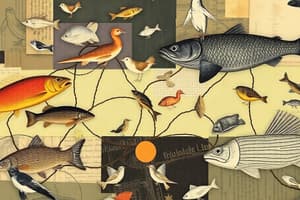Podcast
Questions and Answers
What role do producers play in an ecosystem?
What role do producers play in an ecosystem?
- They produce energy from the Sun through photosynthesis. (correct)
- They are involved in neutral relationships with consumers.
- They consume other organisms for energy.
- They decompose organic material to return nutrients to the soil.
Which of the following interactions is an example of commensalism?
Which of the following interactions is an example of commensalism?
- A parasite living within a host.
- A barnacle attaching to a whale. (correct)
- Two plants competing for sunlight.
- A lion hunting a zebra.
How would the removal of carnivores from a food web primarily affect herbivores?
How would the removal of carnivores from a food web primarily affect herbivores?
- It would increase herbivore populations due to lack of predators. (correct)
- It would create a balanced ecosystem.
- It would have no effect on herbivore populations.
- It would decrease herbivore populations due to overgrazing.
What is the primary function of an ecological pyramid in understanding ecosystems?
What is the primary function of an ecological pyramid in understanding ecosystems?
Which relationship is characterized by one species benefiting at the expense of another?
Which relationship is characterized by one species benefiting at the expense of another?
Flashcards
Producers
Producers
Organisms that make their own food, usually through photosynthesis.
Consumers
Consumers
Organisms that obtain energy by consuming other organisms.
Competition
Competition
A relationship where organisms compete for the same resources, such as food, water, or space.
Food Web
Food Web
Signup and view all the flashcards
Ecological Pyramid
Ecological Pyramid
Signup and view all the flashcards
Study Notes
Ecology
- Ecology is the study of how living things interact with each other and their environment.
Web of Life
- Objectives:
- Create food webs and ecological pyramids to show the relationships between producers and consumers in an ecosystem.
- Give examples of neutralism, competition, predation, parasitism, commensalism, and mutualism.
- Evaluate a statement about the likelihood of life existing on other planets.
- Essential question: How do living things interact?
Producers and Consumers
- Producers (autotrophs): Organisms that make their own food through photosynthesis (e.g., plants, algae).
- Consumers (heterotrophs): Organisms that consume other organisms; they get their energy from consuming producers or other consumers.
Competition
- Organisms compete for limited resources.
- Example: Carnivores in the savanna during the dry season.
Food Chain
- A linear sequence of organisms transferring energy from one to another.
- Producers (plants) → Herbivores (animals) → Carnivores (animals).
Food Web
- A complex network of interconnected food chains showing multiple feeding relationships in an ecosystem.
Ecological Pyramid
- A graphical representation of the trophic levels in an ecosystem where producers form the base, and energy decreases at higher trophic levels.
Symbiosis
- A close relationship between two different species.
- Parasitism: One species benefits, the other is harmed. (Example: ticks on animals)
- Mutualism: Both species benefit. (Example: oxpeckers and animals)
- Commensalism: One species benefits, the other is neither helped nor harmed. (Example: cattle egrets and rhinos)
- Neutralism: Both species do not interact at all; neither species is affected. (Example: black mambas and oxpeckers)
- Amensalism: One species is harmed, the other is unaffected. (Example: grazing herbivores and black mambas)
Studying That Suits You
Use AI to generate personalized quizzes and flashcards to suit your learning preferences.




